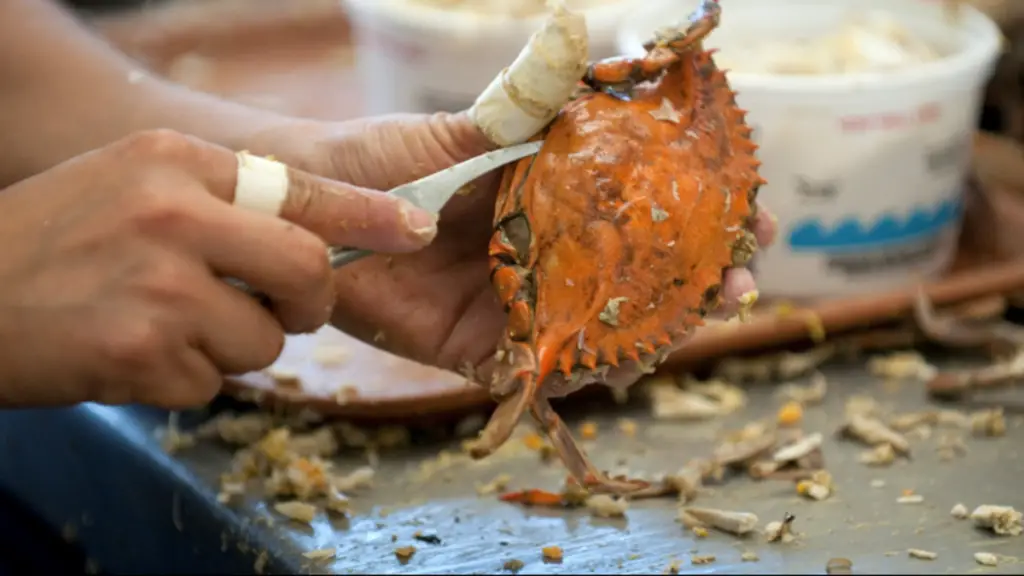If you want crab, you want crab. Whether that be frozen, imitation, or fresh––which by the way, fresh is the best. There may be crab meat left over in the fridge or frozen crab that you forgot to order. Some people may have bought live, fresh crab but didn’t cook it until a few days later. But. you still want to eat it.
You’re hungry and want to hurry up and eat that delicious crab before you become hangry!
How can you tell if your crab has gone bad so you can get on with your meal?
Before we go any further, let’s make sure you know how to buy crab and how to handle, care for, and hold it until you’re ready to eat it.
Crab is one of the most delicious types of seafood, with sweet, succulent meat However, like any perishable food, crab can spoil and become unsafe to eat. Knowing what bad crab looks, smells, and feels like can help you identify spoiled crab before eating it.
Normal Characteristics of Fresh Crab Meat
To recognize signs of spoiled crab, it helps to first understand what fresh crab meat should look like.
When fresh. crab meat has these characteristics
-
Color: The flesh is white, sometimes with a reddish tinge on king and snow crab. There may be brighter red highlights on the legs.
-
Texture The meat is firm and flaky when separated into chunks
-
Smell: Fresh crab gives off a briny aroma, like clean sea air.
-
Taste: Sweet, mild flavor with a subtle saltiness. Not fishy.
-
Appearance: Solid, shiny flesh. No cracks, spots, or blemishes.
As long as the crab meat has been continuously refrigerated, it should retain this freshness 3-4 days after cooking.
Signs of Spoiled Crab Meat
Once crab meat starts decomposing, there are several clear visual and sensory indications.
Color Changes:
-
Gray, blue, brown, or yellow discoloration
-
Dark or black spotting
-
Milky opaque areas
-
Loss of bright white color
Texture Changes:
-
Soft, mushy chunks of meat
-
Gelatinous, slimy consistency
-
Ragged meat fibers
Smell:
-
Ammonia or sulfur odor
-
Rotten, fishy smell
-
Very sweet, unpleasant smell
Taste:
-
Bitter, sharp flavor
-
Tangy, acidic taste
-
Fizzing or tingling sensation
Other Signs:
-
Drying around the edges
-
Liquid pooling around the meat
-
Mold growth
-
Bubbling when cooked
Any of these are clear warning signs that crab has spoiled and should be discarded.
What Makes Crab Meat Spoil
Crab meat goes bad when bacteria multiply quickly, breaking down tissue. Several factors allow this to happen:
-
Time: Crab meat only stays fresh a few days after cooking.
-
Temperature: Heat speeds up bacterial growth causing faster spoiling.
-
Exposure to air: Oxygen allows aerobic bacteria to thrive.
-
Contamination: Bacteria is transferred from hands, utensils, etc.
-
Damage: Cracks or crushing of the crab shell spreads bacteria.
Proper refrigeration right after cooking is key for maximizing shelf life. Only reheat crab meat once before discarding.
Spoiled Crab Safety Hazards
Eating spoiled crab meat can cause severe foodborne illness. Bacteria such as Listeria, Vibrio, Salmonella, and E. coli can grow in spoiled crab. Common symptoms after eating bad crab include:
- Nausea, vomiting, diarrhea
- Fever, chills, cramps
- Headache, dizziness, weakness
- Persistent bloating or gas
In severe cases, bad crab can cause paralysis, meningitis, blindness, kidney failure, or even death in those with compromised immune systems. Babies, pregnant women, seniors and those with underlying medical conditions are most at risk. Don’t take chances with spoiled crab.
How to Avoid Spoiled Crab
Follow these guidelines to prevent crab from going bad:
-
Cook live crab immediately after harvesting or purchasing. Don’t let crabs die before cooking.
-
Rapidly chill just-cooked crab. Don’t allow it to sit at room temperature.
-
Separate meat from shells if storing over 2 days.
-
Keep cooked crab meat refrigerated below 40°F.
-
Store crab in clean, airtight containers. Avoid openings or leaks.
-
Use cooked crab within 3-4 days for maximum freshness.
-
Don’t mix new and old crab meat batches.
-
Discard crab with an off smell, appearance or texture.
Being aware of the signs of spoiled crab and handling crab properly will help avoid foodborne illness. Know when to throw it out to be safe. With some care, you can continue enjoying delicious fresh crab.

Step One: Purchase the Best
Step one is to choose the kind of crab you want to buy based on the meal you want to make.
There is imitation crab, which is actually a seafood paste containing zero crab, called surimi. An 8-oz. bag of imitation crab runs anywhere from $3 to $10, and you get what you pay for. It’ll probably take quite a while for imitation crab to go bad.
How about you skip the fake stuff and go for the good stuff.
You can buy Dungeness crab fresh, frozen, or picked meat in a container. You can also buy it at a market, or you can buy it live and fresh from Fathom Seafood.
Regardless of what you choose, make sure it is of excellent quality.

Step Four: Remember the Basics
There are four things to remember in step four so that you may avoid a crab-tastrophe.
Can you pick the BAD CRAB? Hiii Yolanda(Tenn)How to tell the dfferences “GoodMeat”/”Bad Meat”
FAQ
How do you know if crab meat is bad?
Is brown crab meat okay to eat?
What to do if you eat bad crab meat?
What does spoiled crab meat smell like?
